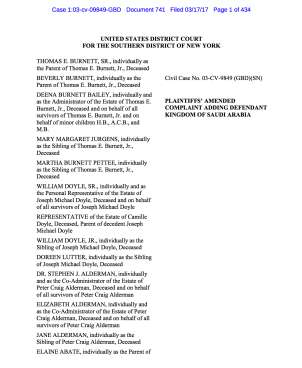Attorneys for 9/11 families, survivors and insurers recently submitted an updated legal complaint in their suit against the Kingdom of Saudi Arabia, which is moving forward with strengthened momentum thanks to the September 2016 enactment of the Justice Against Sponsors of Terrorism Act (JASTA) and new evidence that has emerged over the past year.
The document, which can be read by clicking the image below, spans hundreds of pages. Its length is driven by two factors:
- The large number of plaintiffs who are listed—a stark reminder of just how many individuals and families directly felt the impact of the September 11 attacks.
- The breadth and depth of the plaintiffs’ case that Saudi government officials and employees, along with charities acting as the kingdom’s alter egos, provided funding and material support that enabled al Qaeda to carry out its plot to attack New York and Washington.
The plaintiffs’ case was bolstered by the July 2016 declassification of 28 pages from a joint congressional intelligence inquiry into 9/11.

The 28 pages are included among other exhibits, including Document 17, a file from the 9/11 Commission that was first publicized by 28Pages.org following a tip from 9/11 widow Kathy Owens.
Declassified without publicity, it had gone undetected until a National Archives employee alerted Owens of its existence.
JASTA Impact is Apparent
In the case against the kingdom, “JASTA, very explicitly and for the first time, allows conduct abroad to be considered,”says Michael D. Goldhaber, U.S. correspondent for the International Bar Association. “That opens up whole new vistas for the complainants. This case no longer completely stands or falls on what happened in San Diego or whatever might eventually come to light in Florida.”
The updated complaint “gave an opportunity for the plaintiffs to plow in some very damning allegations arising out of the hijackers’ activity in Germany and also Saudi charities’ activities all around the world,” says Goldhaber, who follows the 9/11 case closely.
Elsewhere in the complaint, a previous argument used by some Saudi charities accused of aiding the 9/11 plotters is now being used against the kingdom.
Earlier in the proceedings, “some of the charities took a calculated gamble to declare sovereign immunity,” says Goldhaber.
Declaring themselves part of the Saudi government was an effective strategy as long as the kingdom enjoyed immunity. Post-JASTA, however, those earlier declarations now threaten to firmly bond the Saudi government to the actions of the charities and their employees.
“It’s an admission against interests for both the charities and the kingdom,” says Goldhaber. “It looked smart for a long time until JASTA.”
